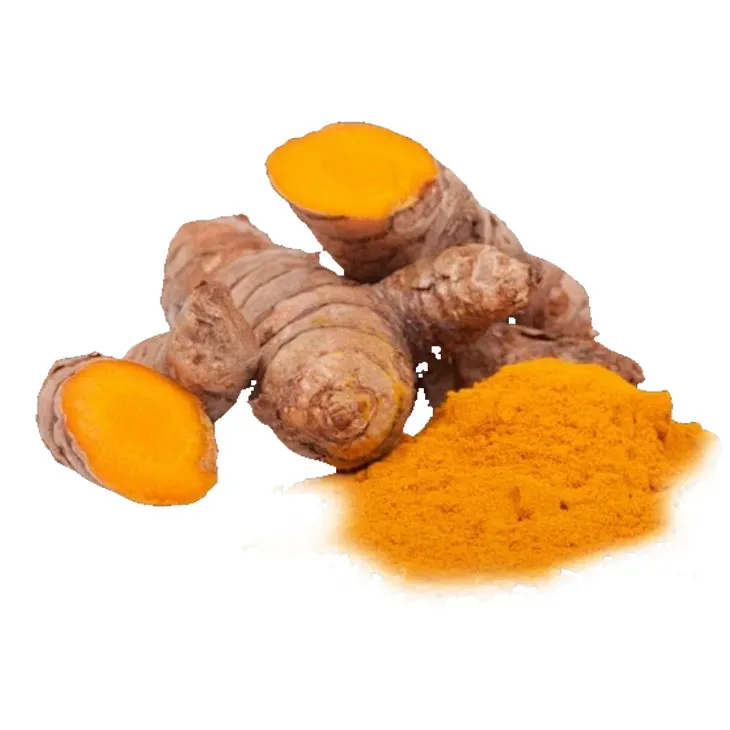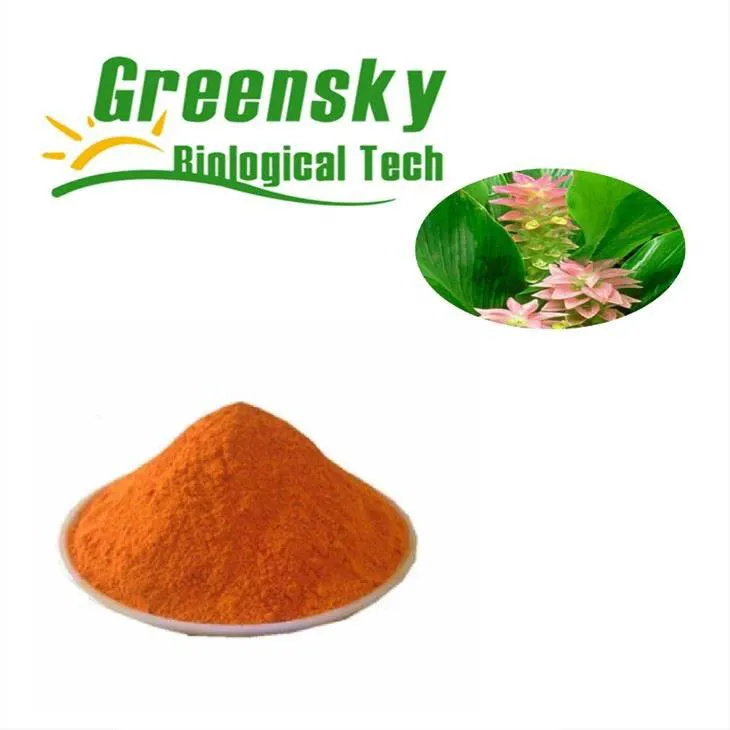- 0086-571-85302990
- sales@greenskybio.com
Ten Application Efficacies of Organic Curcumin on Skin.
2024-12-12

1. Introduction
Organic Curcumin has emerged as a remarkable ingredient with numerous benefits for the skin. Derived from the turmeric plant, it has been used in traditional medicine for centuries. In modern times, scientific research has been uncovering its various efficacies on the skin. This article will explore ten of these important applications.

2. Wound Healing
One of the most significant benefits of organic Curcumin on the skin is its role in wound healing. It has the ability to accelerate cell regeneration, which is crucial for the repair of damaged skin. When the skin is injured, Curcumin can stimulate the growth of new cells, helping to close the wound more quickly. This process involves multiple mechanisms.
Firstly, curcumin can enhance the production of collagen. Collagen is a key protein in the skin that provides structural support. By increasing collagen synthesis, curcumin helps to strengthen the newly formed tissue at the wound site. Secondly, it has anti - inflammatory properties. Inflammation can delay the wound - healing process, but curcumin can reduce inflammation, allowing the body's natural healing mechanisms to function more efficiently.

3. Sebum Regulation
Another important efficacy of organic curcumin is its ability to regulate sebum production. Sebum is an oily substance secreted by the sebaceous glands in the skin. For those with oily skin, excessive sebum can lead to problems such as acne and a shiny complexion. On the other hand, people with dry skin may have insufficient sebum production, resulting in dryness and flakiness.
Curcumin can balance sebum production by interacting with the sebaceous glands. It can help to reduce over - production in oily skin types, preventing clogged pores and breakouts. At the same time, it may also stimulate sebum production in dry skin to some extent, improving the skin's moisture - retaining ability.

4. Anti - Bacterial Protection
Organic curcumin also serves as an effective anti - bacterial agent for the skin. The skin is constantly exposed to various bacteria, some of which can cause infections and skin diseases. Curcumin's antibacterial function can help protect the skin from these threats.
It can inhibit the growth of a wide range of bacteria, including those that are commonly associated with skin infections such as Staphylococcus aureus. By preventing bacterial colonization on the skin, curcumin reduces the risk of developing skin infections, such as impetigo and folliculitis.

5. Anti - Inflammatory Effects
Inflammation is a common factor in many skin problems, including acne, eczema, and psoriasis. Organic curcumin has powerful anti - inflammatory properties that can be beneficial for these conditions.
When applied to the skin, curcumin can suppress the production of inflammatory mediators. These mediators are chemicals in the body that are involved in the inflammatory response. By reducing their production, curcumin can alleviate redness, swelling, and pain associated with inflammatory skin conditions.
Moreover, curcumin can also modulate the immune response in the skin. It can help to regulate the activity of immune cells, preventing an over - active immune response that can contribute to chronic inflammation.

6. Antioxidant Activity
The skin is constantly exposed to environmental stressors such as UV radiation, pollution, and free radicals. These can cause damage to the skin cells, leading to premature aging and various skin problems. Organic curcumin has strong antioxidant activity, which can help protect the skin from this damage.
As an antioxidant, curcumin can scavenge free radicals. Free radicals are unstable molecules that can react with other molecules in the skin, causing oxidative stress. By neutralizing free radicals, curcumin helps to maintain the integrity of the skin cells, reducing the appearance of wrinkles, fine lines, and age spots.
Furthermore, curcumin can also enhance the skin's own antioxidant defense system. It can stimulate the production of antioxidant enzymes in the skin, such as superoxide dismutase and glutathione peroxidase, which can further protect the skin from oxidative damage.
7. Skin Brightening
Many people are interested in achieving a brighter and more even skin tone. Organic curcumin can contribute to this goal through several mechanisms.
Firstly, curcumin can inhibit the production of melanin. Melanin is the pigment responsible for skin color. Excessive melanin production can lead to hyperpigmentation, such as dark spots and melasma. By reducing melanin synthesis, curcumin can help to lighten these areas and even out the skin tone.
Secondly, curcumin has anti - inflammatory and antioxidant properties, which can improve the overall health of the skin. A healthy skin is more likely to have a natural glow and a more even complexion.
8. Anti - Aging Effects
As mentioned earlier, organic curcumin's antioxidant and anti - inflammatory properties are key in its anti - aging effects on the skin.
It can protect the skin from environmental damage, which is one of the main causes of premature aging. By preventing the breakdown of collagen and elastin, two important proteins for maintaining skin elasticity, curcumin helps to keep the skin firm and supple.
In addition, curcumin can also stimulate the production of new collagen and elastin. This can help to fill in fine lines and wrinkles, giving the skin a more youthful appearance.
9. Treatment of Acne
Acne is a common skin condition that affects many people, especially adolescents. Organic curcumin can be an effective treatment for acne due to its multiple properties.
As mentioned before, it has anti - bacterial and anti - inflammatory effects. The antibacterial property can kill the Propionibacterium acnes, which is one of the main causes of acne. The anti - inflammatory effect can reduce the redness, swelling, and pain associated with acne lesions.
Moreover, curcumin can also regulate sebum production, which is another important factor in acne development. By reducing excessive sebum, it can prevent the clogging of pores, which is a precursor to acne formation.
10. Skin Barrier Enhancement
The skin barrier is crucial for protecting the skin from external factors and maintaining its hydration. Organic curcumin can help to enhance the skin barrier function.
It can promote the production of lipids in the skin, which are important components of the skin barrier. By increasing lipid production, curcumin helps to strengthen the skin barrier, preventing water loss and protecting the skin from irritants and allergens.
Furthermore, curcumin's anti - inflammatory and antioxidant properties can also contribute to the overall health of the skin barrier, making it more resilient to damage.
11. Conclusion
In conclusion, organic curcumin has a wide range of efficacies on the skin. From wound healing to anti - aging, from sebum regulation to anti - bacterial protection, it offers many potential benefits for skin health. As research continues, we may discover even more applications of this remarkable ingredient in skin care.
FAQ:
Q1: How does organic curcumin promote wound healing?
Organic curcumin promotes wound healing by accelerating cell regeneration. When there is a wound on the skin, the cells need to regenerate quickly to close the wound. Curcumin can stimulate the cells to divide and multiply at a faster rate, thus helping the wound to heal more rapidly.
Q2: Why is regulating sebum production important for the skin?
Regulating sebum production is crucial for the skin because both excessive and insufficient sebum can cause problems. For oily skin, too much sebum can lead to clogged pores and acne. For dry skin, not enough sebum makes the skin lack moisture and appear dull and flaky. Organic curcumin can adjust sebum production to a proper level, keeping the skin in a healthy state.
Q3: What specific bacteria can organic curcumin protect the skin from?
Organic curcumin has broad - spectrum antibacterial properties. It can protect the skin from common bacteria such as Staphylococcus aureus and Escherichia coli. These bacteria can cause various skin infections, including boils, impetigo, and cellulitis. By inhibiting the growth of these bacteria, curcumin helps keep the skin clean and healthy.
Q4: Can organic curcumin be used on all skin types?
Yes, organic curcumin can be used on all skin types. Since it can regulate sebum production, it is beneficial for both oily and dry skin. Moreover, its anti - inflammatory and antioxidant properties are also useful for normal and sensitive skin. It can soothe inflammation, protect against oxidative damage, and generally improve the health of the skin regardless of skin type.
Q5: How long does it take for organic curcumin to show its effects on the skin?
The time it takes for organic curcumin to show its effects on the skin can vary. For some minor skin issues like reducing inflammation, it may start to show effects within a few days to a week. However, for more complex problems such as significant wound healing or long - term improvement of skin texture, it may take several weeks to months of continuous use to see more obvious and long - lasting results.
Related literature
- The Role of Organic Curcumin in Skin Health"
- "Organic Curcumin: A Promising Ingredient for Skin Care"
- "Beneficial Effects of Organic Curcumin on Different Skin Conditions"
- ▶ Hesperidin
- ▶ citrus bioflavonoids
- ▶ plant extract
- ▶ lycopene
- ▶ Diosmin
- ▶ Grape seed extract
- ▶ Sea buckthorn Juice Powder
- ▶ Beetroot powder
- ▶ Hops Extract
- ▶ Artichoke Extract
- ▶ Reishi mushroom extract
- ▶ Astaxanthin
- ▶ Green Tea Extract
- ▶ Curcumin Extract
- ▶ Horse Chestnut Extract
- ▶ Other Problems
- ▶ Boswellia Serrata Extract
- ▶ Resveratrol Extract
- ▶ Marigold Extract
- ▶ Grape Leaf Extract
- ▶ blog3
- ▶ blog4
- ▶ blog5
-
Pure 85% Tomentil Extract.
2024-12-12
-
Sugarcane Extract
2024-12-12
-
Saffron Extract Powder
2024-12-12
-
Tongkat Ali Extract Powder
2024-12-12
-
Artichoke Extract
2024-12-12
-
Ivy Extract
2024-12-12
-
Soy Extract
2024-12-12
-
Red Wine Extract
2024-12-12
-
Bamboo Leaf extract
2024-12-12
-
Yellow Pine Extract
2024-12-12
-
Astaxanthin
2024-12-12





















